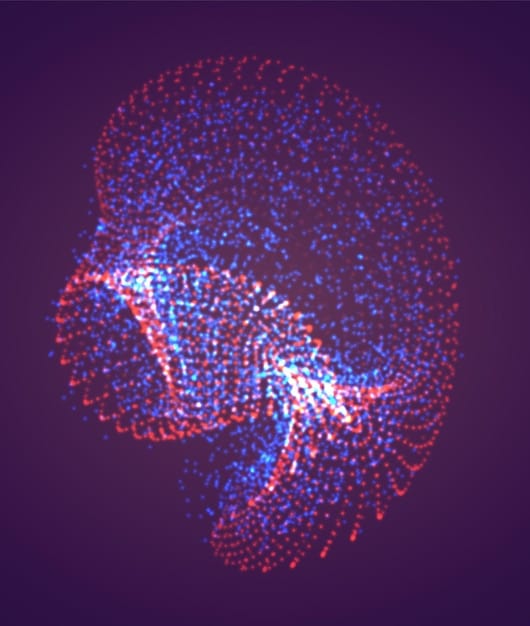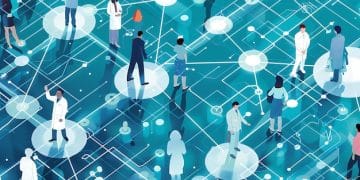US AI Research: Drug Discovery & Personalized Medicine Potentials

US AI research is revolutionizing drug discovery and personalized medicine by accelerating research, improving treatment precision, and optimizing healthcare outcomes through advanced algorithms and data analysis.
The convergence of artificial intelligence (AI) and healthcare in the United States is opening unprecedented avenues for innovation. Let’s delve into how US AI research: exploring the potential of AI-driven drug discovery and personalized medicine, is transforming the landscape of healthcare.
The Rise of AI in US Healthcare Research
The integration of AI technologies into healthcare research in the US signifies a paradigm shift. These advanced tools offer capabilities far beyond traditional methods, promising to accelerate discoveries and improve patient care.
Introduction to AI Applications in Healthcare
AI’s role in healthcare is multi-faceted, spanning diagnostics, treatment planning, drug development, and patient monitoring. Its ability to process vast datasets accurately makes it invaluable in modern medicine.
- Diagnostics: AI algorithms analyze medical images (X-rays, MRIs) to detect anomalies faster and sometimes more accurately than radiologists.
- Treatment Planning: AI can create personalized treatment plans based on individual patient data, optimizing therapeutic outcomes.
- Drug Development: AI accelerates drug discovery by predicting molecular interactions and identifying potential drug candidates.
- Patient Monitoring: Wearable devices and AI algorithms monitor vital signs and alert healthcare providers to potential health crises.
The rapid advancements in AI are not just technological marvels; they represent a fundamental change in how healthcare is approached, making it more data-driven, personalized, and efficient.
AI-Driven Drug Discovery: A New Frontier
One of the most promising areas of US AI research: exploring the potential of AI-driven drug discovery and personalized medicine is the use of AI to revolutionize how new drugs are discovered and developed. AI’s ability to analyze complex biological data and predict the efficacy of drug candidates is speeding up the development process significantly.
Identifying and Validating Drug Targets
AI algorithms can sift through extensive genomic and proteomic datasets to pinpoint promising drug targets. These targets are often validated more quickly and accurately than with traditional methods.
Predicting Drug-Target Interactions
Understanding how a drug interacts with its target is crucial for its effectiveness and safety. AI models predict these interactions, reducing the need for extensive laboratory testing.

By expediting target identification and predicting drug-target interactions, AI-driven drug discovery promises to deliver effective treatments to patients faster than ever before.
Personalized Medicine: Tailoring Treatments with AI
Personalized medicine, where treatments are tailored to individual patients based on their genetic profile, lifestyle, and environment, is another area transformed by AI. US AI research: exploring the potential of AI-driven drug discovery and personalized medicine, is making significant strides in this field.
Analyzing Patient Data for Personalized Treatment Plans
AI algorithms can analyze vast amounts of patient data, including genomic information, medical history, and lifestyle factors, to create personalized treatment plans. These plans are designed to maximize efficacy and minimize side effects.
Genomic Sequencing and AI
With the cost of genomic sequencing decreasing, AI is being used to interpret genomic data and identify genetic markers that predict drug response and disease risk. This helps doctors prescribe the right treatments for the right patients.
- Improved Treatment Outcomes: Personalized treatment plans lead to better health outcomes and reduced healthcare costs.
- Reduced Side Effects: By predicting how a patient will respond to a drug, AI helps minimize adverse reactions.
- Better Disease Management: AI-driven personalized medicine enables proactive management of chronic diseases.
Personalized medicine powered by AI is not just a futuristic concept; it is becoming a reality, changing the way we approach healthcare.
Challenges and Ethical Considerations
While the potential benefits of US AI research: exploring the potential of AI-driven drug discovery and personalized medicine are immense, there are challenges and ethical considerations that must be addressed. These include data privacy, algorithmic bias, and the need for regulatory frameworks.
Data Privacy and Security
The use of AI in healthcare relies on access to large amounts of patient data, raising significant privacy concerns. Robust security measures and compliance with regulations like HIPAA are essential to protect patient information.
Algorithmic Bias
AI algorithms are trained on data, and if that data reflects existing biases, the algorithms will perpetuate those biases. Ensuring fairness and equity in AI-driven healthcare requires careful attention to data collection and algorithm design.

Addressing these challenges is critical to ensuring that AI in healthcare is used responsibly and ethically.
Future Trends in AI-Driven Healthcare in the US
The future of US AI research: exploring the potential of AI-driven drug discovery and personalized medicine looks promising, with several trends poised to shape the field. These include advancements in AI algorithms, increased adoption of AI in clinical settings, and the integration of AI with other emerging technologies.
Advancements in AI Algorithms
Ongoing research is leading to more sophisticated AI algorithms that can better understand complex biological systems, predict drug efficacy, and personalize treatments. These advancements will further enhance the capabilities of AI in healthcare.
Increased Adoption of AI in Clinical Settings
As the benefits of AI become more evident, its adoption in clinical settings is expected to increase. From assisting doctors in diagnosis to monitoring patients remotely, AI will play a larger role in everyday healthcare.
- Remote Patient Monitoring: AI-powered wearable devices will monitor patients remotely, allowing healthcare providers to intervene early in case of health issues.
- Predictive Analytics: AI algorithms will predict disease outbreaks and identify patients at high risk, enabling proactive healthcare interventions.
- Virtual Assistants: AI-powered virtual assistants will provide patients with personalized health advice and support, improving access to care.
The continued evolution of AI promises to revolutionize healthcare, making it more efficient, personalized, and accessible to all.
The Economic Impact of AI in US Healthcare
The economic impact of US AI research: exploring the potential of AI-driven drug discovery and personalized medicine is substantial, with the potential to reduce healthcare costs, improve productivity, and drive economic growth. Investments in AI research and development are expected to yield significant returns in the long run.
Cost Reduction in Drug Development
By accelerating drug discovery and reducing the need for costly clinical trials, AI can lower the cost of developing new drugs. This can make life-saving medications more accessible to patients.
Improved Efficiency in Healthcare Delivery
AI-driven tools and processes can improve the efficiency of healthcare delivery, reducing administrative costs and freeing up healthcare professionals to focus on patient care.
The economic benefits of AI in healthcare are not just financial; they extend to improved health outcomes, increased productivity, and a more vibrant healthcare industry.
| Key Point | Brief Description |
|---|---|
| 🔬 AI Drug Discovery | Accelerates drug identification and validation processes. |
| 🧬 Personalized Medicine | Tailors treatments based on individual patient data. |
| 🛡️ Data Privacy | Ensuring patient data security in AI applications. |
| 📈 Economic Impact | AI’s role in reducing healthcare costs and boosting productivity. |
Frequently Asked Questions (FAQ)
▼
AI algorithms analyze vast datasets to identify potential drug targets and predict drug-target interactions, significantly reducing the time and cost associated with traditional drug discovery methods.
▼
Personalized medicine tailors treatments to individual patients based on genetic, lifestyle, and environmental factors. AI analyzes patient data to create customized treatment plans for optimal outcomes.
▼
Key ethical concerns include data privacy and security, where patient information must be protected, and algorithmic bias, which can lead to unfair or discriminatory treatment outcomes.
▼
AI-powered wearable devices and monitoring systems track vital signs and alert healthcare providers to potential health crises, enabling early intervention and improved patient outcomes.
▼
AI is expected to reduce healthcare costs by optimizing processes, lowering drug development expenses, and improving efficiency, leading to economic growth and better health outcomes overall.
Conclusion
The intersection of AI and healthcare in the US is paving the way for remarkable advancements in drug discovery and personalized medicine. While challenges and ethical considerations must be addressed, the potential benefits—ranging from faster drug development to tailored treatments and significant economic impact—make US AI research: exploring the potential of AI-driven drug discovery and personalized medicine a transformative force in healthcare.





